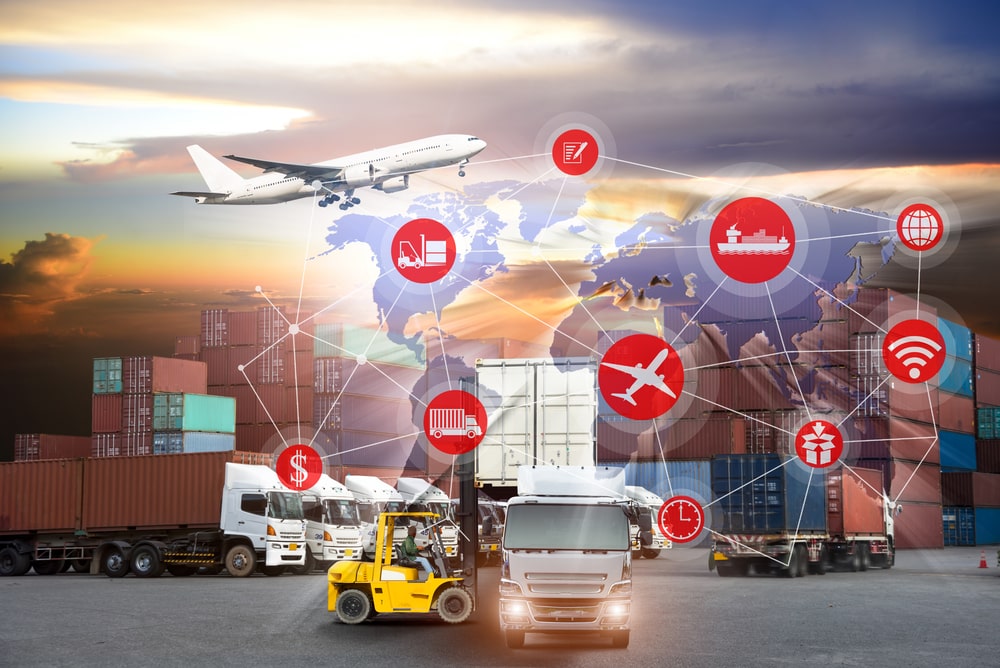The shipping industry has traditionally relied on conventional methods and extensive paperwork. However, in recent years, shipping companies have increasingly recognized the potential of cloud-based solutions in shipping. This shift brings a new era of efficiency, connectivity, and adaptability, departing from conventional practices.
It is not just a trend but a fundamental shift that promises to optimize processes, reduce costs, and ensure a more sustainable and competitive future for the entire industry. In this blog, we will delve into the key components, advantages, technologies, and real-world applications contributing to the transformative impact of cloud shipping solutions.
Key Takeaways
- Cloud solutions mark a decisive shift from manual shipping processes. Cloud-shipping solutions transform logistics, enhancing efficiency, cutting costs, and refining decision-making. This strategic move towards cloud technology signals an evolution in the shipping industry, promising agility, cost-effectiveness, and data-driven navigation through modern logistics complexities.
- Cloud services embrace a pay-as-you-go model, eradicating upfront infrastructure costs. Scalability optimizes resource allocation, reducing expenses during lulls and enhancing performance in peak demand. Improved accessibility via secure remote cloud access fosters real-time collaboration and decision-making.
Evolution of Shipping Operations with Cloud Solutions
The maritime industry is experiencing a fundamental shift in integrating cloud solutions in shipping processes. Previously relying on manual processes, every shipping company has now streamlined and modernized every aspect of logistics with cloud technology.
Cloud-shipping solutions provide advantages, marking a departure from the limitations of conventional practices. Cloud-shipping companies can enhance efficiency, reduce shipping costs, and make better decisions.
Key Components of Cloud Solutions in Shipping
These components are reshaping the traditional landscape of the maritime industry. This section focuses on how these key components contribute to the contemporary shipping operation landscape’s efficiency, flexibility, and innovation.
Cloud Computing Basics
Cloud-based shipping solutions rely on digital solutions to offer scalable, accessible, and cost-efficient computing resources. This technology allows shipping companies to use virtualized infrastructure, set up custom applications, and access software features online.
With scalable resources, remote accessibility, and robust security measures, cloud computing basics empower the shipping industry to enhance efficiency, reduce costs, and adapt to evolving demands.
Infrastructure as a Service (IaaS)
Infrastructure as a Service (IaaS) provides virtualized computing resources, eliminating the need for physical hardware. Shipping companies can access and manage servers, storage, and networking components over the internet, tailoring their infrastructure to specific needs without limiting to physical hardware.
With IaaS, companies can scale their resources according to demand, ensuring optimal performance during peak shipping periods while minimizing costs during periods of reduced activity. The scalability feature enables seamless resource adjustments, making IaaS a vital tool for the shipping industry.
Platform as a Service (PaaS)
Platform as a Service (PaaS) is a vital cloud-based software. It offers a comprehensive platform for developing, deploying, and managing applications without the headaches of supporting infrastructure. Shipping companies leverage PaaS to create custom applications tailored to their unique operational needs.
This technology creates and implements solutions for route optimization, shipment tracking, and logistics management. PaaS enhances agility by streamlining the development process, enabling faster innovation and adaptation to dynamic shipping requirements.
Software as a Service (SaaS)
Software as a Service (SaaS) delivers cloud-based shipping software applications over the Internet on a subscription basis. Shipping companies can access and utilize these applications without local installations.
SaaS solutions in shipping may include fleet management software, cargo tracking systems, or logistics management platforms. This model ensures seamless updates, accessibility from any location, and cost-effectiveness, allowing shipping businesses to focus on core operations while leveraging the latest software functionalities.
Advantages of Cloud-Shipping Software in Shipping Operations
Embracing cloud-shipping software represents a transformative leap for the shipping industry. This technology offers numerous advantages, revolutionizing traditional operations. From cost efficiency and scalability to real-time data management and enhanced accessibility, cloud solutions redefine the landscape of shipping processes.
Cost Efficiency and Resource Optimization
Cloud services ensure cost efficiency and resource optimization by eliminating the need for significant upfront investments in physical infrastructure. Companies can scale their computing resources based on demand, paying only for what they use.
This pay-as-you-go model minimizes operational costs during periods of lower activity, while the scalability feature allows optimal resource allocation during peak times. Additionally, cloud solutions streamline maintenance and updates, further reducing the total cost of ownership and enhancing overall financial sustainability.
Scalability for Growing Operations
Scalability is a pivotal asset for growing operations. Cloud software allows companies to adjust their computing resources quickly and swiftly to accommodate increasing demands. Whether handling a surge in shipment volumes or expanding services, scalability ensures optimal performance without significant investments in new hardware.
This adaptability supports seamless growth and enhances overall operational efficiency, allowing shipping companies to navigate dynamic industry demands flexibly and easily.
Enhanced Accessibility and Mobility
With data and applications hosted on the cloud solution, different stakeholders can securely access crucial information from anywhere with an Internet connection. This accessibility fosters real-time collaboration among dispersed teams, accelerates decision-making processes, and enables remote monitoring of the supply chain operations.
The mobile-friendly nature of cloud solutions ensures that key functionalities are readily available on various devices, contributing to increased efficiency, responsiveness, and adaptability in the dynamic shipping environment.
Real-time Data Management and Analytics
Real-time data management and analytics enable instant access, processing, and analysis of critical data, offering a comprehensive view as you manage shipping. Companies can swiftly make informed decisions, optimize routes, monitor cargo conditions, and enhance efficiency.
The ability to generate actionable insights in real-time empowers shipping businesses to respond promptly to changing circumstances, minimize risks, and continually improve their processes for a more streamlined and data-driven approach to operations.
Technologies Powering Cloud Shipping Companies
Cloud shipping companies harness the power of transformative technologies. These innovations redefine operational norms, offering real-time tracking, predictive analytics, and enhanced transparency. This section explores how these technologies synergize with cloud solutions, propelling shipping companies into a new era of efficiency, reliability, and innovation.
Internet of Things (IoT) Applications
IoT applications provide real-time visibility and control over the operations of cloud shipping companies. IoT sensors and devices embedded in cargo, vessels, and infrastructure transmit data to the cloud, facilitating accurate tracking and monitoring.
This data-driven approach enhances decision-making, enables predictive maintenance, and optimizes routes. The seamless integration of IoT with cloud solutions offers unprecedented insights, allowing shipping companies to improve efficiency, ensure cargo integrity, and respond proactively to dynamic maritime conditions.
Artificial Intelligence (AI) and Machine Learning (ML)
Artificial Intelligence (AI) and Machine Learning (ML) elevate cloud shipping companies by revolutionizing decision-making and operational efficiency. These technologies analyze vast datasets in the cloud, offering predictive insights for route optimization, demand forecasting, and proactive maintenance.
AI-driven algorithms enhance order management, streamline logistics, and adapt to dynamic shipping conditions. By leveraging the power of AI and ML within cloud solutions, shipping companies optimize processes, reduce costs, and stay competitive in the rapidly evolving maritime landscape.
Blockchain Technology in Shipping
Blockchain technology in shipping empowers cloud-based companies by enhancing transparency and security in supply chain management. Utilizing a decentralized and tamper-resistant ledger, blockchain ensures the integrity of transactional data, reducing fraud risks and improving traceability.
Smart contracts within the blockchain automate and streamline documentation processes, reducing delays and errors. By integrating blockchain with cloud solutions, shipping companies achieve heightened efficiency, trust, and accountability, fostering a more resilient and transparent maritime ecosystem.
Challenges and Considerations in Implementing Cloud-Based Solutions
As the maritime industry sails into a cloud-centric future, implementing cloud-based solutions comes with challenges and considerations. Navigating issues related to security, integration with existing systems, workforce training, and regulatory compliance becomes crucial.
Security and Privacy Concerns
Security and privacy concerns loom large in the adoption of cloud-based solutions for shipping. While these solutions offer efficiency, data accessibility, and real-time insights, safeguarding sensitive information becomes paramount. The risks include:
- Unauthorized access
- Data breaches
- Potential loss of control over critical data
It is essential to strike a balance between security precautions and accessibility. To preserve the integrity of shipping operations and inspire confidence in stakeholders, it is critical to guarantee strong encryption, access controls, and conformity with industry standards.
Integration with Existing Systems
Legacy infrastructure may not seamlessly align with modern cloud technologies, leading to compatibility issues. Achieving a smooth transition requires meticulous planning, potential system upgrades, and customized integration solutions.
Ensuring that both old and new systems operate cohesively is essential to prevent disruptions, maintain workflow continuity, and fully leverage the benefits of cloud-based solutions without compromising the efficiency of established shipping processes.
Training and Skill Development
Adopting cloud-based solutions in shipping necessitates an entirely new approach to workforce skills, posing a challenge in training and development. Employees must be proficient in utilizing new technologies, understanding cloud computing platforms, and navigating advanced features.
Effective training programs must be implemented to bridge this knowledge gap. Upskilling the workforce is crucial to ensure a smooth transition, optimize operational efficiency, and empower personnel to leverage the full potential of cloud-based solutions in the ever-evolving maritime landscape.
Regulatory Compliance in the Shipping Industry
Strict regulations govern data security, privacy, and the handling of sensitive information in maritime operations. Adapting cloud solutions to comply with these standards requires meticulous attention to detail, comprehensive risk assessments, and continuous monitoring.
Navigating a complex regulatory landscape is crucial to avoid legal complications and maintain the trust of stakeholders while harnessing the transformative benefits of cloud technology in shipping operations.
Future Trends of A Cloud Shipping Company
As cloud technology continues to reshape the shipping industry, the future of cloud-based shipping companies holds exciting possibilities. From integrating advanced technologies like 5G and edge computing to the growing emphasis on sustainability and green initiatives, this section unveils the upcoming innovations that promise to propel cloud shipping into a more efficient, connected, and environmentally conscious era.
Continued Integration of Advanced Technologies
The continuous integration of cutting-edge technologies is critical to the future of cloud shipping solutions. These technological advancements will all help in decision-making. By utilizing these advanced technologies, cloud-based shipping businesses can maintain their leadership in productivity, agility, and competitiveness while skillfully navigating the changing maritime scene and responding to new demands from the sector.
Focus on Sustainability and Green Technologies
Cloud-based solutions will incorporate eco-friendly measures as the shipping and logistics industry increasingly emphasizes environmental responsibility. This includes optimizing routes for fuel efficiency, adopting energy-efficient data centers, and leveraging technology to minimize the ecological footprint.
By integrating sustainable practices into cloud shipping solutions, companies aim to contribute to a greener future while aligning with global initiatives for environmentally conscious shipping processes.
Evolving Security Measures in Cloud-Based Systems
Security measures are evolving to address emerging threats. Continuous advancements in encryption, access controls, and threat detection technologies ensure robust protection against unauthorized access and data breaches.
As cyber threats evolve, cloud-based systems in shipping are anticipated to adopt adaptive security frameworks, artificial intelligence-driven threat analysis, and proactive measures to safeguard sensitive information. The ongoing evolution of security measures reinforces the resilience and integrity of cloud-based systems in the industry.
Conclusion
In conclusion, cloud-based solutions have significantly transformed the shipping and logistics industry, revolutionizing traditional shipping operations. These solutions provide scalable, accessible, and cost-efficient computing resources, eliminating the need for physical hardware and streamlining every aspect of logistics.
The seamless integration of cloud solutions has resulted in unprecedented insights, enabling shipping companies to improve efficiency, ensure cargo integrity, and respond proactively to dynamic maritime conditions. Cloud-based solutions empower the shipping industry with unparalleled connectivity, scalability, and adaptability, marking a fundamental shift that promises to optimize processes, reduce costs, and ensure a more sustainable and competitive future for the entire industry.





